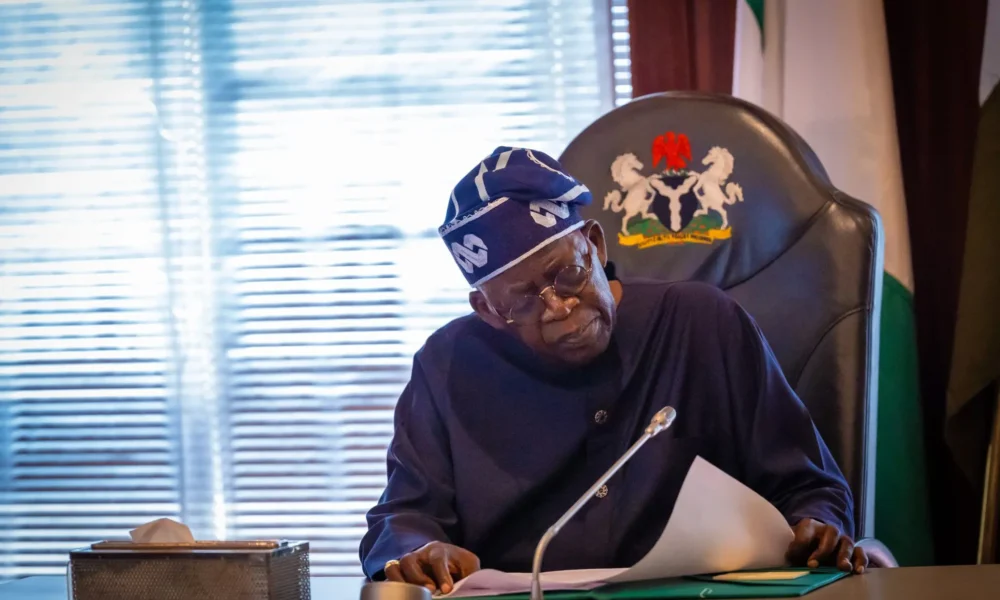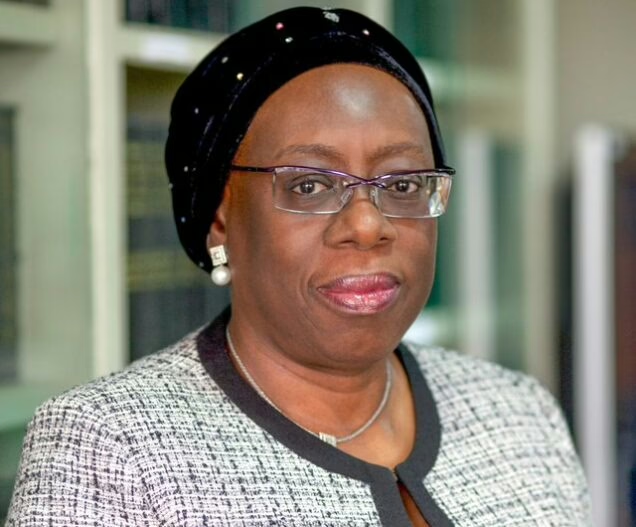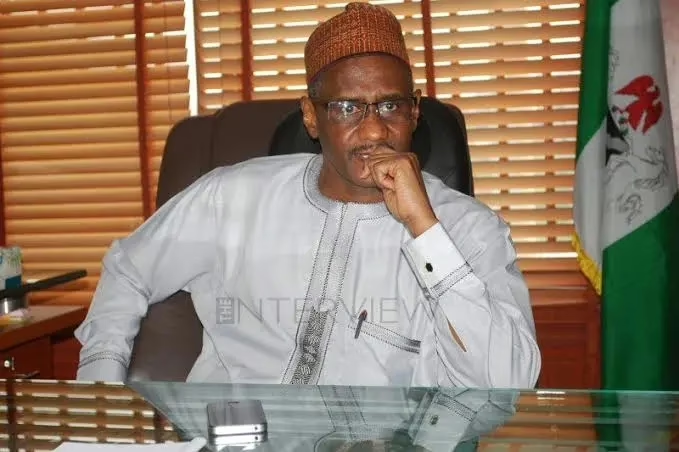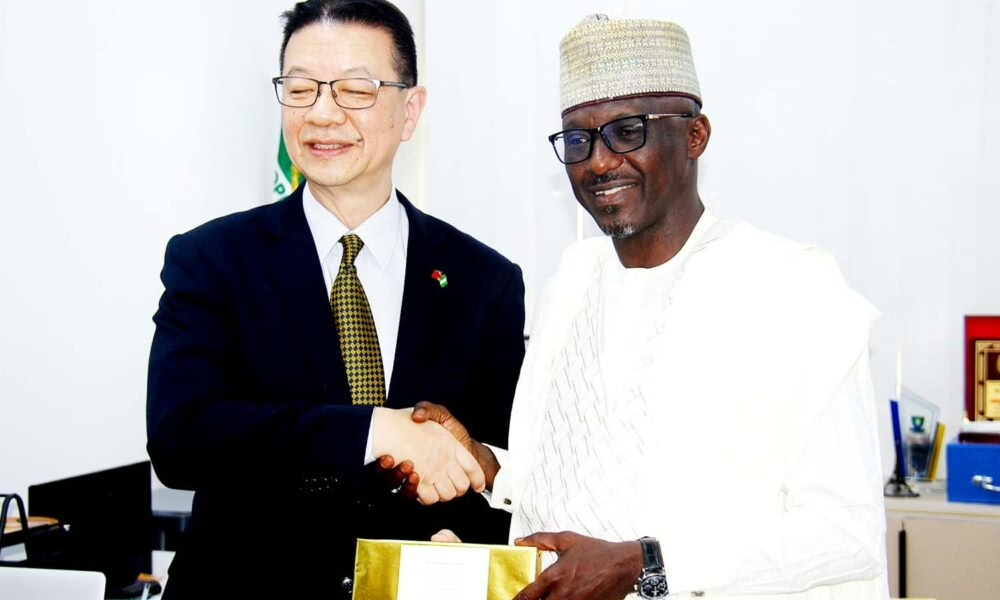Tinubu waxes nostalgic, Shettima gets a new house
Stephen Angbulu
“Nigeria, we inhale thee…” a seven-year-old pupil began as she tried to sing the new (old) national anthem.
I saw another video clip on social media showing the hilarious confusion on the assembly ground of a primary school a day after President Bola Tinubu revived an anthem from 46 years ago.
Nothing prepared those kids for the shock.
In the weeks before May 29, President Tinubu’s first year in office, Nigerians were eager to know what he had in store, especially on the minimum wage.
For those in the administration, celebrations were common during such periods. This culture likely stems from the big deal Nigerian parents make out of their children’s one-year birthday.
The Office of the Secretary to the Government of the Federation lined up a series of activities to mark the new year.
These included plans to unveil a 19×10 meter portrait of President Tinubu at the Abuja City Gate, air a documentary titled Omo Iya’loja, a photo exhibition and a musical civil-command performance by the Military Band Corps, the National Troupe of Nigeria and the National Council for Arts & Culture.
However, the President cancelled all these events. Instead, he tasked his ministers to “give an account of their stewardship for the past nine months.
In any case, only a few people saw the abrupt change to the country’s anthem, which many Nigerians and non-Nigerians considered one of the most melodic in the world. Composed in 1978 by a team of five Nigerians, with a distinctive tune from the Nigerian Police Band, Arise O Compatriots graced various arenas when eminent Nigerian athletes like Tobi Amusan clinched gold. But all that became history when nostalgia hit the President like a ton of bricks.
He was not alone. The deputy spokesperson of the House of Representatives, Philip Agbese, boasted, “This anthem…evokes a sense of nostalgia and patriotism in the hearts of many Nigerians. It reminds us of our history, our struggles, and our triumphs.”
In less than two weeks, the bill to replace Nigeria’s anthem, sponsored by the majority leader of the House, Julius Ihonvbere, enjoyed tremendous support. This left citizens wondering why other pressing bills did not receive such speedy backing.
To mark his first year in office, Tinubu signed Ihonvbere’s bill into law, replacing the indigenous anthem with one composed by the British—a testament to what some Nigerians call our never-dying passion for imported goods.
For those who were listening, the President had always hinted at his love for the old anthem long before assuming office. In a 2022 interview to mark Nigeria’s 62nd anniversary, Tinubu said, “If I have my way, I will bring back our old national anthem. That described us much better…I don’t know why we changed it. It’s about service. It’s about diversity. It’s about commitment and nation-building. So that is my message.”
Beyond this, could the President be implementing the recommendations of the 2014 confab? Is he taking a jab at one of his predecessors, Olusegun Obasanjo, under whose watch—in 1978—the now-obsolete anthem was adopted? Maybe. Maybe not.
Having fulfilled his promise, the new move split Nigerians into for-or-against camps. Some said the old anthem bore more substance. An Instagram user, Fekomi, said, “Honestly speaking, although it’s longer, if you read the wordings, they have more substance than the national anthem we knew.”
Another user wrote, “I woke up to the reality that me (barely 24) and my daughter (3) will be learning the new National Anthem together, and I could fail if asked to recite it in a public quiz. My daughter now has the chance to even memorise the anthem before I get it. Tinubu, what have you done?”
“Osinbajo should start primary school tours to teach children Tinubu’s new national anthem,” an X user named Novi Everest joked.
Meanwhile, others want the anthem change to mean a broader impact beyond songs. Nigerian comedian Igosave spoke for this camp when he wrote, “Since you have brought back the old national anthem, can you also bring back our old dollar price, old fuel price, old prompt flight operating style, old taxation and old security?”
Amidst the rising cost of living and a thousand existential challenges facing Nigerians, President Tinubu affirmed that changing the collective music remains a priority—perhaps when the gbedu changes, the state of the nation might follow suit.
During a meeting with the Arewa Consultative Forum at the Presidential Villa, he said, “Let me allude to something that happened yesterday. The change of national anthem, ‘Nigeria, we hail thee.’ Some people say is that your priority?”
“It’s my priority. I agree with the National Assembly. If they make a law, I’ve got to obey that law, or we disagree openly and close the chapter.
“But the question of diversity. Who gave us the name Nigeria? Is it not Britain? Have we changed our name? We are Nigerians. Our passport shows that. As long as we are Nigerians and one family, we remain and protect our diversity and love one another as brothers and sisters,” Tinubu explained.
After the high-spirited session at the National Assembly on May 29, President Tinubu and the lawmakers took the first step to sing the new anthem. Observing the movement of their lips shows that many of them would need a refresher course.
Had the instrumentals not overshadowed their voices, we would have heard a discordant chorus of frog-like baritones echoing through the chamber.
With the national anthem changed, what’s next? The flag? The Coat of Arms? Will the eagle be replaced with an owl? Maybe the two horses will give way to donkeys to depict ‘service to the nation.’ Only the President and his league of lawmakers know what’s next for change.
Shettima gets new house
On Friday, President Tinubu commissioned the N21bn official residence of his deputy, Senator Kashim Shettima, in Abuja.
At the event, Tinubu said, “The provision of a suitable residence for the Vice President is not merely a matter of convenience” but also “a symbol of respect for the office and the individual who occupies it.”
However, it soon became clear that Shettima represented Tinubu at the event. “Okay, that’s interesting! The VP commissioning his own house?” I mused. Instinctively, I blurted, “That sounds like a groom officiating his own wedding!”
Still taken aback, I showed the optics to a senior friend who, though offering some perspective, couldn’t help but liken the scenario to the 1947 song titled ‘I’m My Own Grandpa.’
There could be practical reasons for the President delegating the task to Shettima. Having inaugurated several FCT projects in the past two weeks, he could be taking this time to focus on more pressing matters such as the minimum wage. An official explained, “This is an FCT project being commissioned by the President again. This time, however, he delegates it to the VP.’
Plans to build a new residence for Vice Presidents began in the Goodluck Jonathan administration in 2010.
However, the project remained dormant under Buhari, with Vice President Osinbajo residing in Aguda House throughout his tenure.
Considering its size, I will not be surprised if the VP misses his way around the house now and then.
For instance, in January 2009, only one week after becoming President, Barack Obama was photographed from the gardens of the White House, missing his way.
After meeting House and Senate Republicans that afternoon, Obama was returning to the Oval Office when things took a humorous twist.
Mistaking the panned window for a door, he kept tugging at the handle until he spotted the actual door a few steps ahead.
Clad in just a blazer in the biting winter, he joined the ranks of presidents who got momentarily lost in the White House.
Would Shettima need a map for the first few weeks? Maybe. Maybe not.











